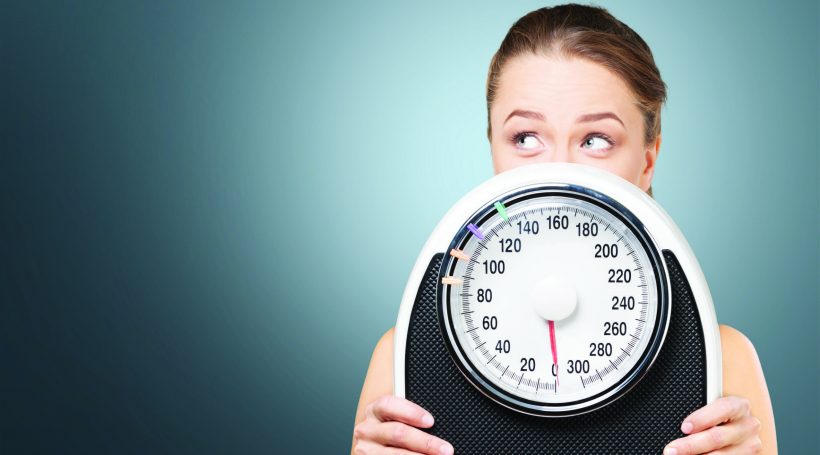Before you throw the scale – and your resolution to shed the pounds – out the window, check out this advice from SJ health professionals on how to overcome a few of the most common weight-loss mistakes.
- You’re paying attention to calories, but not much else
When it comes to weight loss, not all calories are created equal.
“Just because something is only 80 calories doesn’t make it healthy, says Suzanne Mackey, MD, of Salveo Weight Management.
While it is true that all calories contain the same amount of energy, Mackey says the key is understanding that the body responds differently to calories from different types of foods. Simply put, just because a banana only has 105 calories doesn’t mean it’s a better choice than a handful of almonds (roughly 160 calories).
“Fruit can be quite healthy with lots of vitamins and minerals, but it can also have a whole lot of carbs,” Mackey says. And carbohydrates – be it pasta, crackers and even fruits like that banana – raise your blood’s level of insulin, which signals to your body that it needs to store fat cells.
Conversely, those almonds, and other foods that are naturally high in fat and protein– think nuts, avocados and lean meats – are dense in calories, but they help you stay full without triggering the storage of fat cells.
That’s why Mackey says she advises patients to “start the day with a low carb intake and lots of protein, which help you avoid getting hungry later.”
She also says you need to be wary of what you drink – yes, even if that bottle of healthy-looking juice only has 60 calories.
“Even if it’s just fruit juice, it’s going to give us a quickly elevated blood sugar level,” Mackey says. “We take it in so quickly that the sugar gets stored in our fat cells. That’s definitely one way to sabotage weight loss.”
- You’re not taking menopause into account
When you think of menopause, you might automatically assume it just means hot flashes and mood swings. And while hormone fluctuations are certainly behind those symptoms, they can also cause fluctuations on your scale.
“Women in their 40s usually start to notice their bodies are slowing down,” says Amy Articolo, DO, of Salveo Weight Management. “There’s not the same amount of ‘oomph,’ and that can be reflected in the metabolism. It’s certainly not a myth and certainly not a unique thing to struggle with.”
In fact, research conducted by experts at the International Menopause Society found that women gain an average of 10 pounds around the onset of menopause. The hormonal shifts of menopause actually change the distribution of body fat in women, making it more likely to accumulate in the abdomen.
Unfortunately, the hormonal changes wreaking havoc on your waistline are probably doing a number on your sleep patterns too – which can make weight gain even worse.
“During menopause, the body produces less progesterone, which promotes sleep. And women who sleep less than five hours a night are more likely to gain weight,” says Wendy Martinez, MD, of Advocare The Women’s Group for OB/GYN. “Plus, after not sleeping well, it’s harder to do things like exercise and plan healthy meals.”
It’s what Articolo calls the “perfect trifecta” for weight gain: your metabolism is slowing down, you’re losing muscle mass and you’re not getting a good night’s sleep.
If you’re trapped in the cycle of menopause-related insomnia and weight gain, “the best thing to do is work on getting that good night’s sleep, even if it means trying sleep medication or hormone therapy,” says Martinez. “Then you can focus on exercising 30 minutes five days a week and eating a diet that’s low in fat and high in whole grains, fruits and vegetables.”
- You’re eating more because you’re working out
You managed to fit in a quick run before the kids woke up, so to reward yourself you hit the drive-thru for a peppermint mocha.
But even with running one or two times a week, you notice the scale still isn’t budging.
“Most people don’t exercise rigorously enough to warrant a substantial change to calorie intake,” says says Elizabeth Levinson, MD, of Virtua Medically Supervised Weight Loss. “And, people tend to greatly overestimate how many calories they’re burning during the day.”
(That tall peppermint mocha can pack a whopping 350 calories. And that 30-minute run? It probably only burned about 300 calories.)
And while you deserve kudos for getting active, Levinson says, “try finding other healthy, non-food ways to reward yourself when it is truly time for celebration.”
She also encourages patients to try a food tracker – MyFitnessPal and LoseIt are popular apps – for a few days to see exactly what they’re consuming and how the calories add up.
But if you truly are famished after exercising, Levinson recommends evaluating your eating schedule and make sure you’re eating enough before and after exercising. “Having a protein shake in the hour before or after exercise can be helpful,” she says.
- You’re not eating enough
Though slashing calories and maybe even skipping a few meals here and there might seem like a quick way to drop pounds, you’re not doing your body any favors. In fact, you’ll probably end up doing more harm.
“When you skip meals or when you don’t consistently eat a balanced diet every day, your body feels like you’re starving it,” says Vitelese Hutton, RD, a bariatric dietician at Our Lady of Lourdes Medical Center. “Since it feels like it’s starving, it’s going to naturally hold on to everything because it kicks into starvation mode.”
Putting yourself on a fad diet that cuts out entire food groups – like trying to eliminate carbs from your diet – isn’t going to help either, says Hutton.
“Even if you do lose the weight from a crash diet, you’ll gain it back once you start to eat normally again,” she says. “A healthy weight loss involves not only eating consistently, but also eating a variety of foods.”
“Think about balancing your choices better. Instead of cutting out all carbs, consume healthier ones instead, like whole grains,” says Hutton. “And, of course, don’t forget your fruits and veggies.”










